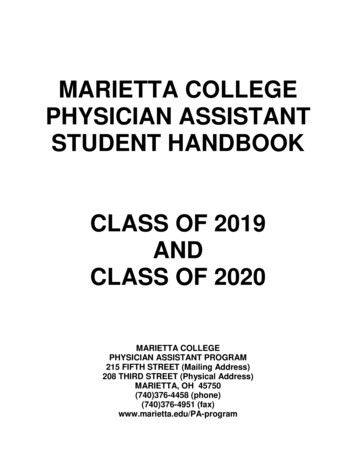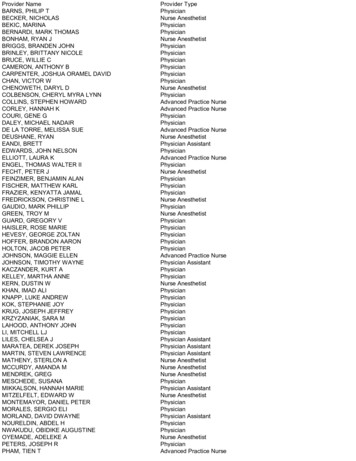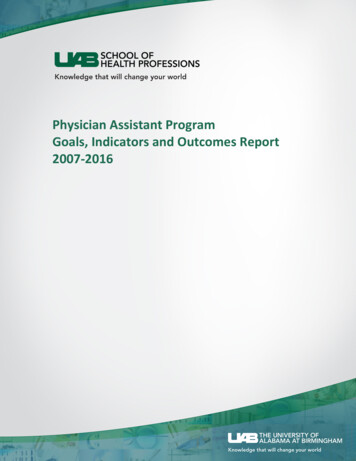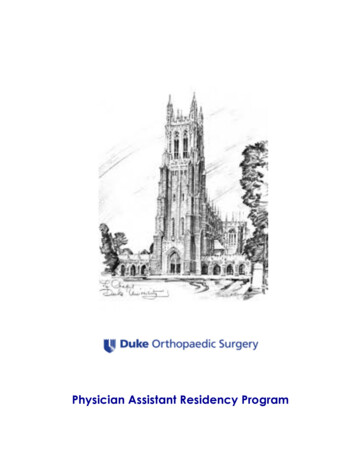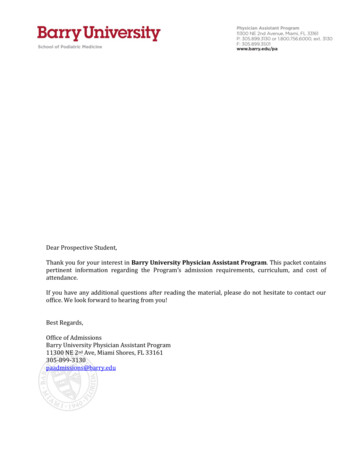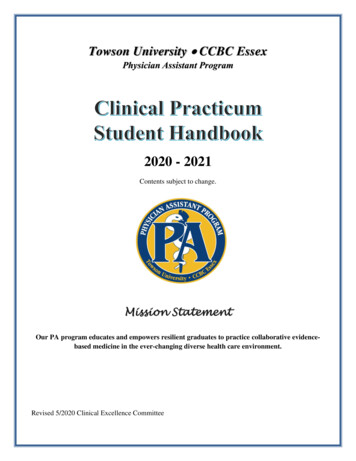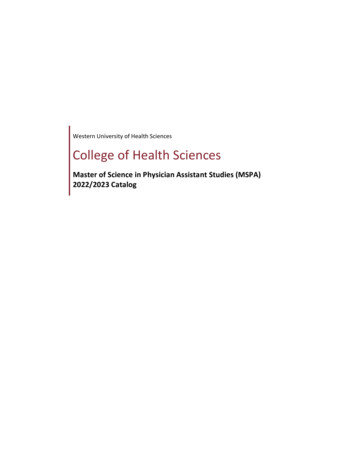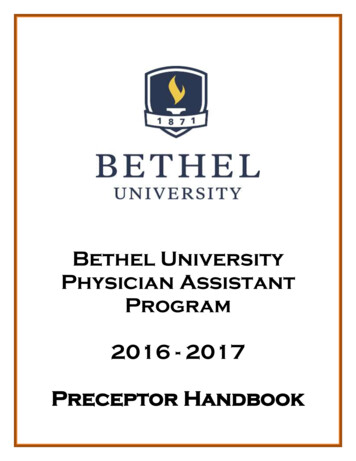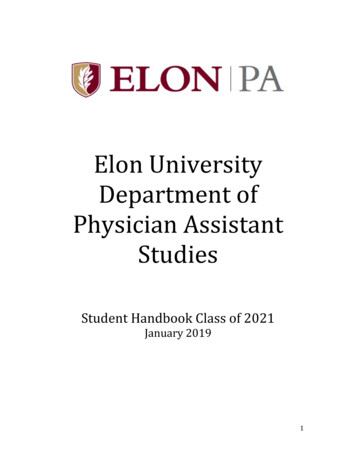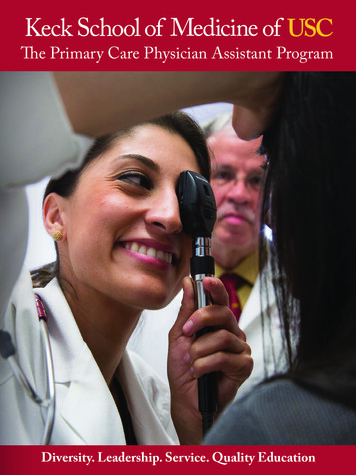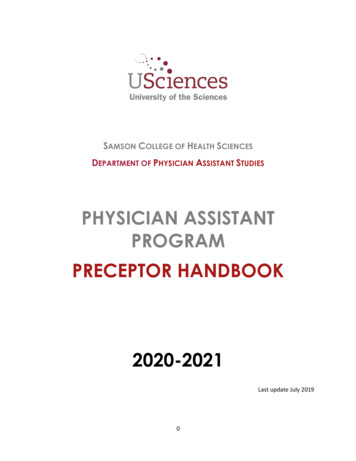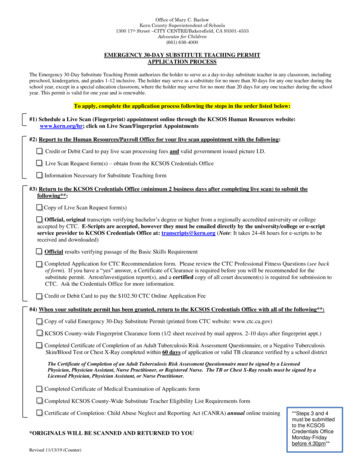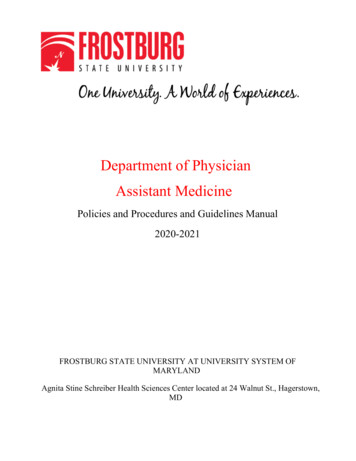
Transcription
Department of PhysicianAssistant MedicinePolicies and Procedures and Guidelines Manual2020-2021FROSTBURG STATE UNIVERSITY AT UNIVERSITY SYSTEM OFMARYLANDAgnita Stine Schreiber Health Sciences Center located at 24 Walnut St., Hagerstown,MD
1
ContentsDPAM Vision, Mission and Program Goals . 3DPAM Learning Outcomes . 4Curriculum and Course Sequence (117 Credits). 6DPAM Technical Standards . 7DPAM Organizational Structure. 102020/2021 Tuition and Fee Guidelines . 14Tuition and Fees. 14Payment . 16Refund Policy. 16PA Program Admission Requirements, Process and Procedures. 17DPAM Policies . 30DPAM Student Drug Screen Policy. 30DPAM Student Criminal Background Check . 33DPAM Student Health Policy . 37DPAM Academic Performance, Professionalism and Progression Policy . 41DPAM Faculty Advising Policy . 58DPAM Infection Control, Safety and Personal Security Policy . 60DPAM Dress Standard . 67DPAM Student Employment Policy . 69DPAM Social Media . 712
DPAM Vision, Mission and Program GoalsUniversity MissionFrostburg State University is a student-centered teaching and learning institution featuringexperiential opportunities. The University offers students a distinctive and distinguishedbaccalaureate education along with a select set of applied master’s and doctoral programs.Frostburg serves regional and statewide economic and workforce development; promotescultural enrichment, civic responsibility, and sustainability; and prepares future leaders tomeet the challenges of a complex and changing global society.PA Program VisionFrostburg State University’s Physician Assistant Studies program will educate a PhysicianAssistant workforce committed to excellence, compassion, and patient-centered care toserve rural and medically underserved areas in Maryland and beyond.PA Program MissionThe Mission of the Frostburg State University’s Physician Assistant Program is to educatestudents in compassionate patient-centered care. Students will learn best practices, useinnovative technology, and work in inter-professional teams to deliver quality care,particularly in rural and medically underserved areas in Maryland and beyond. FrostburgState University Physician Assistant graduates will have a commitment to excellence,inclusivity, and community service.PA Program GoalsGoal 1: Prepare Physician Assistant students with the core medical knowledge and skillsto deliver quality healthcare, achieving first time PANCE scores at or above the nationalaverage.Metric: 1st year PANCE ratesOverall pass PANCE ratesGraduation ratesGoal 2: Prepare students in the use of technology and interprofessional educationopportunities to improve access to care and physical exam and diagnostic skills in allclinical setting.3
Metric: Student exit interview to reflect how goal was metFaculty survey to determine if goal was metGoal 3: Prepare graduates to evaluate clinical data and research and make evidencebased decisions to provide safe, quality care for all patients.Metric: Student exit interview to reflect how goal was metFaculty survey to determine if goal was metGoal 4: Prepare graduates to meet the healthcare needs of rural and medicallyunderserved populationsMetric: 30% or more of clinical practice experience will be in rural or medicallyunderserved clinical sites for all students20% of students will have 50% or more of their clinical site placements inrural or medically underserved areasDPAM Learning OutcomesUpon completion of the FSU PA Program, graduates are expected to be competent in thefollowing areas with an emphasis on rural and medically underserved populations:Medical KnowledgeMK1 Demonstrate an understanding for the medical, behavioral and social knowledgenecessary to evaluate and manage patients across all ages and patient populations in bothprimary care and specialty settings.Interpersonal Skills and Communication:IPSC1 Elicit an accurate medical history from patients.IPSC2 Perform a detailed physical exam relevant to the medical history.IPSC3 Document a clinical encounter in the patient record.IPSC4 Deliver accurate patient education that encompasses verbal, non-verbal and written formsof information to the patient and their care team that considers disease prevention andhealth awareness.IPSC5 Provide an oral presentation of a clinical encounter.IPSC6 Give or receive a patient handover to transition care responsibly.Clinical Problem Solving:CPS1 Demonstrate an ability to formulate a differential diagnosis following a clinicalencounter.4
CPS2 Demonstrate an ability to recommend and interpret appropriate diagnostic studies toassist in the evaluation and treatment of the patient.CPS3 Demonstrate the ability to develop and implement an appropriate therapeuticmanagement plan, either pharmacological or non-pharmacological, based on the patient’smedical history, physical exam and diagnostic study findings.CPS4 Recognize a patient requiring urgent or emergent care, and initiate evaluation andmanagement.CPS5 Demonstrate an ability to make informed decisions about the care of patients consistentwith up-to-date scientific evidence, patient preferences, and sound clinical judgment.CPS6 Identify system failures and contribute to a culture of safety and improvement.Technical Skills:TS1 Demonstrate the ability to obtain informed consent and perform clinical procedurescommon to primary care to include: venipuncture, intravenous access, joint injections andaspirations, wound management, laceration repair, casting and splinting, strep screening,urinalysis, catheterization, performing pelvic exams, and interpretation of radiographicimages, pulmonary function tests and ECGs.TS2 Effectively utilize telemedicine equipment and demonstrate the ability to discernconditions that are appropriate for treatment using telemedicine/telepsychiatry.Professionalism:PROF1 Demonstrate professionalism with high ethical principles, sensitivity, andresponsiveness to all patients, their care teams, and members of the healthcare team.5
Curriculum and Course Sequence (117 Credits)Phase I - Summer ICreditsDPAM 601 Human Anatomy I2DPAM 631 Developing the PA Professional I3DPAM 610 Clinical Medicine IPhase I -Summer IICredits23DPAM 685 Foundations of SurgeryDPAM 690 Emergency MedicineIntensiveDPAM 695 Transition to Clinical PracticeDPAM 621 Basic Science I3TOTAL6DPAM 641 Patient Assessment & Diagnostic Methods I3Phase II – Summer IIDPAM 651 Pharmacology I317DPAM 700 SCPE 1- Family MedicineDPAM 701 SCPE 2- Internal MedicineTOTALTOTALPhase I - Fall ICredits31Credits448Phase II - Fall IICreditsDPAM 602 Human Anatomy II2DPAM 702 SCPE 3- Pediatrics4DPAM 632 Developing the PA Professional II2DPAM 703 SCPE 4 General Surgery4DPAM 611 Clinical Medicine II6DPAM 704 SCPE 5 Psychiatric Medicine4DPAM 622 Basic Science II4DPAM 705 SCPE 6- Women's Health4DPAM 642 Patient Assessment & Diagnostic Methods II4DPAM 652 Pharmacology II3DPAM 660 Population Health223TOTALPhase I - Winter IDPAM 675 GeriatricsDPAM 680 PediatricsCredits22DPAM 670 Functional and Preventive MedicineTOTALPhase I -Spring ITOTALPhase II - Winter IIDPAM 707 SCPE 7- Elective I16Credits3TOTAL315CreditsDPAM 603 Human Anatomy III2DPAM 633Developing the PA Professional III2Phase II - Spring IIDPAM 706 SCPE 8- EmergencyMedicineDPAM 709 Summative (Capstone)DPAM 612 Clinical Medicine III6DPAM 707 SCPE 9- Elective II4DPAM 623 Basic Sciences IIIDPAM 643 Patient Assessment & Diagnostic MethodsIIIDPAM 653 Pharmacology III4DPAM 707 SCPE 10 - Elective III4DPAM 665 Research & Evidence Based MedicineTOTAL2234Credits44TOTAL163*SCPE Sequence May Vary (DPAM – 700, 701, 702, 703, 704, 705, 706, 707)6
DPAM Technical StandardsApplicants to the Frostburg State University Master of Medical Science in PhysicianAssistant Studies program are selected based on their academic, personal and extracurricularattributes. Applicants must also have the intellectual, physical and emotional capabilities to meetthe requirements of their program’s curriculum and of a successful career in medicine.These standards specify the attributes and behaviors considered essential for successfullycompleting PA training and enabling each graduate to enter clinical practice. Because thesestandards describe the essential functions that students must demonstrate to meet therequirements of PA training within a generalist education model, they are prerequisites foradmission, continuation and graduation.FSU will consider for admission any applicant who meets its academic and nonacademiccriteria and who demonstrates the ability to perform skills listed in this document, with orwithout reasonable accommodations, consistent with the Americans with Disabilities Act and theRehabilitation Act. Our institution is committed to considering all qualified applicants withoutdiscrimination or based on any protected characteristics such as race, sex, age, religion, nationalorigin, disability, sexual orientation, gender identity, or veteran status. It is the policy of the PAProgram that all students must possess the intellectual, physical and emotional capabilitiesnecessary to undertake the required curriculum in a reasonably independent manner withouthaving to rely on intermediaries and that all students must be able to achieve the levels ofcompetence required by the faculty. All candidates for admission, those both with and withoutdisabilities, are expected to be competitive with others in the applicant pool across definedcognitive and non-cognitive factors. The institutional policy is to make admissions on a case-bycase basis and the basis of each applicant’s qualifications to contribute to FSU’s PA Programeducational mission. For purposes of this document and unless otherwise defined, the term“applicant” or “candidate” means applicants for admissions to the PA program as well asenrolled PA students who are candidates for promotion and graduation.Technical standards for PA program admission,continuation, and graduationA candidate for the Master of Medical Science (MMS) degree earned after successfulcompletion of the PA Program must have abilities and skills in the five functional areasdescribed below and must have the physical and emotional stamina and capacity to function in acompetent manner, and consistent with these standards, in the classroom and in clinical andlaboratory settings, including settings that may involve heavy workloads, long hours andstressful situations.a. Observation – A candidate must be able to: observe demonstrations and visual presentations in lectures and laboratories.observe patients accurately and completely both at a distance and closely.7
This standard requires functional vision, hearing, and somatic sensation.b. Communication – A candidate must be able to: perceive nonverbal communication, speak intelligibly, hear sufficiently, andobserve patients in order to elicit information.elicit and transmit patient information in oral and written English to members ofthe health care team.communicate effectively and sensitively with patients.demonstrate reading skills at a level sufficient to accomplish curricularrequirements and provide clinical care for patients.be capable of completing appropriate medical records and documents in writtenand electronic form in a thorough and timely manner.c. Sensory and Motor Coordination and Function – A candidate must: possess motor skills sufficient to directly perform palpation, percussion,auscultation, and other basic diagnostic procedures.be able to execute motor movements required to provide basic medical care.Examples of basic medical care include, but are not limited to airwaymanagement, placement of catheters, suturing, phlebotomy, application ofsufficient pressure to control bleeding, simple obstetrical maneuvers, etc. (Suchactions require coordination of gross and fine muscular movements, equilibrium,and functional use of the senses of touch and vision).be able to manipulate equipment and instruments to perform basic laboratory testsand procedures.be able to transport themselves from one location to another in a timely fashion inorder to facilitate patient care responsibilities and necessary to receive educationaltraining.d. Intellectual-Conceptual, Integrative and Quantitative Abilities. Problem solving is thecritical skill demanded of Physician Assistants. This requires that students have the ability tomeasure, calculate, reason, analyze, and synthesize. – A candidate must: be able to incorporate new information from peers, teachers, and the medicalliterature in formulating diagnoses and plans.be able to independently access and interpret medical histories or files.identify significant findings from history, physical examination, and laboratorydata.provide reasoned explanations for likely diagnoses and prescribed medicationsand therapy.recall and retain information in an efficient and timely manner.e. Behavioral and Social Attributes – A candidate must:8
possess the ability to use their intellectual capacity, exercise good judgment, andpromptly complete all responsibilities attendant to the diagnosis under potentiallystressful and/or emergency circumstances.be able to accept criticism and respond by appropriate modification of behavior.be able to develop mature, sensitive, and effective relationships with patients andcolleagues.have a high level of compassion for others with sufficient interpersonal skills tointeract positively with people from all levels of society, all ethnic backgrounds,and all belief systems.be able to adapt to changing environments and to learn in the face of uncertaintiesinherent in the practice of medicine.be able to use supervision appropriately and act independently, when indicated.Process for Assessing the Applicant’s Compliance with theTechnical StandardsApplicants are required to attest at the time they apply and accept an offer to matriculatethat they meet these technical standards and thereafter must attest on an ongoing basis that theycontinue to meet these standards. These standards are not intended to deter any student whomight be able to complete the requirements of the curriculum with reasonable accommodations.An accommodation is not reasonable if it poses a direct threat to the health or safety of selfand/or others, if making it requires a substantial modification in an essential element of thecurriculum, if it lowers academic standards or if it poses an undue administrative or financialburden. Requests from applicants for reasonable accommodations in meeting the technicalstandards will be reviewed and considered by an officer appointed by the University to evaluatestudent requests for accommodations. Information required within a request for accommodationsincludes, at a minimum, the following, and these required elements must be provided at theapplicant’s expenses: Documentation of the disability from a licensed professionalThe diagnosis of the disability using standard nomenclatureA description of the student’s functional limitations due to the disabilityCopies of the evaluation report(s) on or accompanied by a letter on the evaluatingprofessional’s letterheadA description of the requested accommodationFor additional information about the University’s process for assessing an applicant’scompliance with the technical standards, please contact the PA Program.9
DPAM Organizational StructureCollege of Liberal Arts and Sciences Organizational StructureThe College of Liberal Arts and Sciences (CLAS) is one of three colleges with Frostburg StateUniversity. The college consists of 19 departments, including the School of Physician AssistantStudies. Learn more about the CLAS - ex.php. The Department Chair of thePhysician Assistant Program reports directly to the Dean of the College of Liberal Arts andSciences.Department of Physician Assistant Medicine (DPAM)Organizational StructureThe Department of Physician Assistant Studies consists of four faculty members and two staffmembers whose activities are divided among administrative and academic tasks.Beth Smolko,DmSc, PA-C, ProgramDirectorMatthew Beckwith, MDMedical DirectorVichuda WachsPA Program AdministrativeAssistantCameron DennisonLab Manager/Clinical Site SupportDavid J. Bunnell,MSHS, PA-CClinical CoordinatorKen Pardoe,MS, PA-CPrincipal FacultyCarrie McMahon,MPAS, PA-CElizabeth Budny-Buckley,MPAS, PA-CAcademic CoordinatorPrincipal Faculty10
Administrative Roles Program Director/Department Chair – Beth Smolko, DmSc, PA-CClinical Coordinator – David J. Bunnell, MSHS, PA-CAcademic Coordinator – Carrie McMahon, MPAS, PA-CPrincipal Faculty – Ken Pardoe, MS, PA-CPrincipal Faculty – Elizabeth Budny-Buckley, MPAS, PA-CStaff Clinical Site Support/Lab Manager – Cameron DennisonVichuda Wachs-Administrative AssistantDPAM Committee Structure and ResponsibilitiesProgram activities for the FSU Physician Assistant program are implemented through a structureof committees that meet regularly to identify and discuss program issues, determine action plansand evaluate outcomes. The following committees make up the committee structure of theDepartment of Physician Assistant Medicine. PA Program CommitteePurpose: The purpose of the PA Program Committee is to serve as the universityadvisory committee to the PA Program Director to provide guidance on issues related tothe PA program development to include but not limited to:o Faculty and staffo Budgeto Assessmento University Policy alignmento Program developmento Operational issuesMeeting Frequency: WeeklyDay and Time: 3rd Friday at 10 a.m. Chair - Beth Smolko, DmSc, PA-C, Program Director Carrie McMahon, MPAS, PA-C, Academic Coordinator David J. Bunnell, MSHS, PA-C, Clinical Coordinator Ken Pardoe, MS, PA-C, Principal Faculty Elizabeth Budny-Buckley, MPAS-PA-C, Principal Faculty Cameron Dennison, Lab Manager/Clinical Site Support Vichuda Wachs, Administrative Assistant11
Admissions CommitteePurpose: The purpose of the Admissions Committee is to oversee and coordinate theapplication and admission process to include but not limited to:a. Reviewing and revising admission requirementsb. Reviewing and revising admission selection criteria and processc. Development and revision of the interview processd. Assessment of the admission policies and processesMeeting Frequency: WeeklyDay and Time: Monday at noonPre- Admission Process ReviewInitial Screening SelectionPost Interview DaysSelection MeetingPost Selection AssessmentMembership: Chair – Carrie McMahon, MPAS, PA-C, Academic Coordinator Beth Smolko, DmSc, PA-C, Program Director Matthew Beckwith, MD, Medical Director David J. Bunnell, MSHS, PA-C, Clinical Coordinator Ken Pardoe, MS, PA-C, Principal Faculty Elizabeth Budny-Buckley, MPAS-PA-C, Principal Faculty Cameron Dennison, Lab Manager/Clinical Site Support Vichuda Wachs, Administrative AssistantPlease note that other FSU faculty, alum, community partners including medicalproviders may be involved in interview events and activities, but the selection ofcandidates will be the responsibility of the Admissions committee. Curriculum CommitteePurpose: The purpose of the Curriculum Committee is to oversee and coordinate the PAprogram curriculum to include but not limited to:a. Curriculum design and managementb. Curriculum evaluationc. Review and make recommendation for related policies and formsMeeting Frequency – MonthlyDay and Time: Monday at noonMembership: Chair-Carrie McMahon, MPAS, PA-C, Academic Coordinator Ken Pardoe, MHS, PA-C, Principal Faculty Beth Smolko, DmSc, PA-C, Program Director Matthew Beckwith, MD, Medical Director David J. Bunnell, MSHS, PA-C, Clinical Coordinator Elizabeth Budny-Buckley, MPAS-PA-C, Principal Faculty12
Academic and Professionalism Progress Review CommitteePurpose: The APPRC functions to uphold the academic, clinical education andprofessional conduct policies of FSU PA program. The committee approves students foradvancement from semester to semester and from didactic to clinical phase of theprogram. The APPRC also reviews student issues, both academic and professional, whichmay result in probation or dismissal, makes recommendations and approves remediationwhere appropriate.Meeting Frequency – Each semester or as neededDay and Time: As neededMembership: Chair- Beth Smolko, DmSc, PA-C, Program Director Matthew Beckwith, MD, Medical Director Carrie McMahon, MPAS, PA-C, Academic Coordinator David J. Bunnell, MSHS, PA-C, Clinical Coordinator Ken Pardoe, MS, PA-C, Principal Faculty Elizabeth Budny-Buckley, MPAS-PA-C, Principal Faculty Assessment CommitteePurpose: The Assessment Committee is responsible for the overall design, development,implementation of the program’s assessment plan, data collection and reporting.Meeting Frequency – WeeklyDay and Time: Tuesday at noonMembership: Chair – Beth Smolko, DmSc, PA-C, Program Director Matt Beckwith, MD, Medical Director David J. Bunnell, MSHS, PA-C, Clinical Coordinator Carrie McMahon, MPAS, PA-C, Academic Coordinator Policy and Procedure Committee (Quarterly)Purpose: With input from the faculty and various committees the Policy and ProcedureCommittee is responsible for reviewing and updating program policies and procedures.Meeting Frequency – Spring and FallDay and Time: Monday at noonMembership Chair – Beth Smolko, DmSc, PA-C, Program Director Ken Pardoe, MS, PA-C, Principal Faculty Matt Beckwith, MD, Medical Director David J. Bunnell, MSHS, PA-C, Clinical Coordinator Carrie McMahon, MPAS, PA-C, Academic Coordinator Elizabeth Budny-Buckley, MPAS-PA-C, Principal Faculty13
2020/2021 Tuition and Fee GuidelinesTuition and FeesIn-State per credit hourRegional per credit hourOut-of-State per credit hourTechnology fee per credit hourUniversity Summer Fee 516 616 750 15 80Course fees:A&P course fee (Anatomy Gift Registry fee) 140 per coursePatient Assessment and Diagnosis Course fee (lab consumables) 140 per course (3 courses)Program fee ( 100 per semester)University Technology ( 15 per credit hour)SCPE Course fee (PAEA end of rotation exam 40 per course) 10 coursesTransition to Clinical Year Course fee ( 45 PAEA PACKRAT exam, 300 ProfessionalPatient lab UMD)Summative/Capstone Course fee ( 99 PAEA end of curriculum exam and 300 ProfessionalPatient lab UMD)Below is an estimate of the tuition and fees for the 2020-2021 academic year. Notwithstandingany other provision of this or any other Frostburg State University publication, Frostburg StateUniversity reserves the right to make changes in tuition, fees, and other charges at any time suchchanges are deemed necessary by Frostburg State University and the University System ofMaryland Board of Regents. Costs subject to change prior to Summer 2021. Based on 117 credithours, 68 credits year 1 and 49 credits year 2.TuitionIn-State TuitionRegional TuitionOut-of-StateTotal Fees 528 per credit hour 631 per credit hour 770 per credit hourTotal Two Year Estimated Tuition and FeesYear 1 Year 2Total 35,905 25,872 61,777 42,908 30,919 73,827 52,360 37,730 90,090 2,604 2,566 5170In-StateRegionalOut-of-State 66,947 78.997 95,26114
* Please note that regional tuition rates apply to those who reside within 100-mile radius of theFSU campus as the crow flies. For more information go to .phpOther Estimated Expenses per YearHousing Allowance per yearBoard Allowance per yearBooks, Supplies and Program Specific Costs (HealthInsurance, drug screen and background check,ACLS/PALS/BLS, Professional OrganizationMemberships, lap top maintenance etc., PANCE Exam fee)Miscellaneous (personal, transportation, etc.)Total Other Estimated Expenses **Year 1 10,200 6,000Year 2 10,200 6,000 6,000 5,000 27,200 6,000 5,000 27,200**Other Estimated Expense amounts were developed to establish maximum financial aidallowances for typical students. Students are highly encouraged to establish a budget, reduceexpenditures, and borrow via student loans in incremental amounts to help limit their educationaldebt. For additional questions please contact FSU Office of Financial Aid. 301.687.4301,fsufinaid@frostburg.edu Many FSU PA students complete the Free Application for FederalStudent Aid (FAFSA) in order to apply for student loans to support their graduate education(School Code 002072). Information about these loans is available in the Office of FinancialAid. For information or assistance please contact the Financial Aid Office directly.EquipmentWristwatchWhite jacket (Short, finger-tiplength)FSU student PA patchPA program identificationbadgePercussion hammerPocket pen lightSmart Phone or Personal DigitalDevice (PDA)StethoscopeVisual acuity cardBagOtoscope InsufflatorRechargeable diagnostic setSphygmomanometerTuning ForksProtective EyewearTape MeasureScrew top containerEstimated Cost 20 - 40 20- 40 5 each 10 2 - 10 2 90 - 400 100 - 150 3 50- 100 7 360 - 750 42 - 200 7 10 5 115
Note: Students are encouraged to wait on the purchase of the above equipment. FSU willprovide more information and specific requirements at the time of orientation.PaymentApplication FeeFor each application cycle prospective candidates must pay or obtain a waiver for the CASPAapplication fee. These fees and policies regarding payment and refund are set by CASPA.Additional information is available on their website. Applicants invited for interview will beasked to fill out a supplemental application and will be required to pay the 45 fee which is nonrefundable.Tuition PaymentTuition payment deadlines follow the university billing office payment deadlines which can befound on the billing office website rativeOffices/billing-office/DepositAll applicants accepted into the program will be charged a 500 nonrefundable deposit to holdtheir seat. This money will be applied toward their first semester tuition upon matriculation.Refund PolicyA student who withdraws from the PA Program, takes an authorized leave of absence, oris dismissed from the Program, is eligible for a refund in compliance with university billing andfinancial aid policies and practices and in conjunction with federal regulations. Informationrelated to these policies and refund schedule can be found at ative-Offices/billing-office/refund-policy.php.The non-refundable deposit to hold a student’s slot in the class, originally credited to tuition, willnot be included in the refund calculation.16
PA Program Admission Requirements, Process andProceduresSummer 2021 Admission CycleCASPA opensApplication completed and e-submitted toCASPA*Supporting application materials due to programor CASPAInterview top candidatesAcceptance invitation to those selectedCommitment response dueClasses startApril 2020No later than November 1, 2020November 1, 2020 (CASPA verificationdate)June - DecemberJune-JanuaryTwo weeks after admissions letter isreceivedMay 2021Admission requirementsPhase I – Academic RequirementsThe FSU Physician Assistant Program is open to applicants who have earned, or will earn, by theend of the spring semester prior to summer semester entry, a baccalaureate degree from aregionally accredited institution of higher education. Applicants must have a GPA of 3.0 on a4.0 scale, or higher, at the time of application and before matriculation into the program.Prerequisites, with the exception of one required non-science prerequisite course, must becompleted for letter grade with at least a grade of C or higher at the time of application.Therefore, students are encouraged to complete all prerequisites by the end of the summer priorto the year of matriculation.The following requirements must be met unless otherwise not
The Mission of the Frostburg State University's Physician Assistant Program is to educate students in compassionate patient-centered care. Students will learn best practices, use innovative technology, and work in inter-professional teams to deliver quality care, particularly in rural and medically underserved areas in Maryland and beyond.
